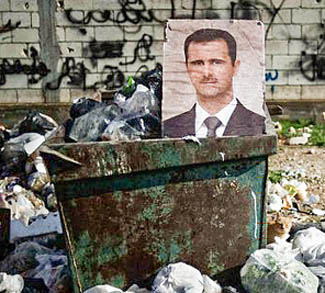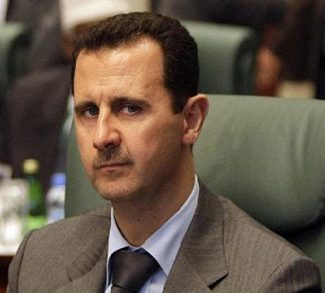The goal of organizing a Syrian peace conference must seem like a moving target to US policy planners of late. And unlike President al-Assad’s backers in Moscow, Washington’s preferred outcome is only drifting further away from the realm of possibility.
The Syrian opposition, and by extension Washington’s negotiating position in a potential Geneva peace conference has been eroded in the past couple of weeks.
The biggest blow came from the Russian government, the Obama administration’s nominal partner in organizing an international conference to seek a negotiated end to the Syria conflict. The delivery of S-300 missiles, the first shipment of which has already arrived in Syria, gives al-Assad enough of a technical boost as to seriously raise the price of entry for any Western military intervention in the conflict. The S-300 platform is roughly analogous to US Patriot missiles, and is seen as a “game-changer” by the Israeli Air Force.
The S-300 shipment strengthens al-Assad’s hand considerably, and this newfound confidence is already on display in a Friday interview where the Syrian president warns that future Israeli air strikes will be met in kind.
The S-300 green light might have resulted from a diplomatic miscalculation on the part of the EU. In raising the arms embargo against the Syrian rebels with an announcement that there were ‘no immediate plans’ for such sales, the EU was likely attempting to chip away at the Syrian government’s negotiating position ahead of a peace conference. Russia’s decision to go ahead with the long-delayed shipment of S-300 missiles, whether a response to the EU’s decision or not, effectively reversed the momentum and shored up the Syrian government’s position instead.
The recent proliferation of Hezbollah fighters on the battlefield is another unsettling development, both for the Obama administration and Syria’s neighbours as well. Hassan Nasrallah has been ramping up his rhetorical intensity in support of the al-Assad regime, and anywhere from 3,000-7,000 Hezbollah fighters have been deployed to Syria, with up to 1,700 of them taking part in the battle for Qusair.
Of course, any sustained involvement from Hezbollah in the Syrian civil war risks disrupting the delicate sectarian equilibrium that prevails in Lebanon. Just last week, two rockets landed in Hezbollah strongholds in Beirut, and sectarian conflicts have stated to crop up across the country.
These momentum shifts are being reflected in the tide of battle, as the strategic town of Qusair is now almost completely controlled by Syrian government forces. Whether or not this victory turns into a rout of rebel forces remains to be seen, but as it stands now: this is one of the most important victories for President al-Assad since the conflict began.
Given these setbacks, the Obama administration’s insistence on going forward with a peace conference in Geneva comes across as slightly puzzling, especially since it’s clear that Washington won’t be in the position to demand the harsh preconditions that it has in the past. To do so would invite a no-show from the Syrian government and Washington’s ‘partner’ in Russia, and to abandon the precondition of al-Assad stepping down would likely invite a no-show from the rebel side.
So what is motivating the Obama administration to go ahead with a doomed conference?
Some critics believe that the Obama administration is being played by its Russian counterpart, and that Washington maintains its support for a peace conference out of simple diplomatic naivety.
There is however another possibility. Washington might see the conference as a face-saving escape hatch from what appears to be an expensive quagmire. Considering the overstretched US military, President Obama’s longstanding resistance to arming a fractured and partially radicalized Syrian opposition, and perhaps most importantly- the advancing trend of US energy independence from the Middle East, the costs are starting to dramatically outweigh the benefits of arming the Syrian opposition.
Viewed in this light, the conference represents a chance for President Obama to bring the diplomatic reality back in step with the situation on the ground where pro-government forces are making considerable advances. Yet this is easier said than done. As Senator McCain’s surprise trip to rebel-held territories recently demonstrated, there is still a lot of domestic support in the United States for arming the rebels and going all-in against the Syrian regime.
Whether President Obama would be able to use a peace conference in such a way is primarily a factor of the face-saving concessions being offered up by the al-Assad regime and its benefactors. Are we heading for some vaguely-worded promises of future elections? Only time will tell.




